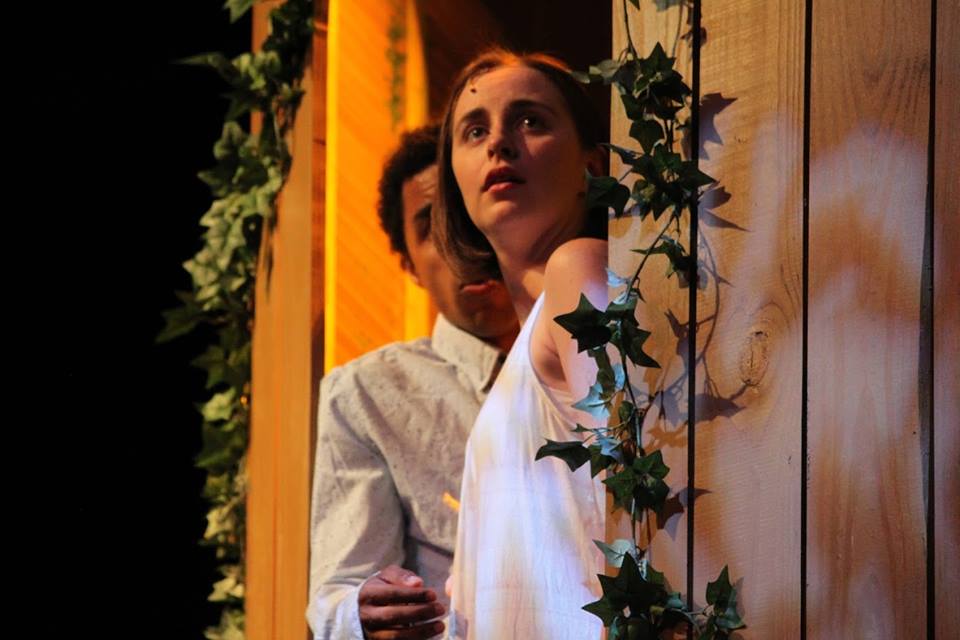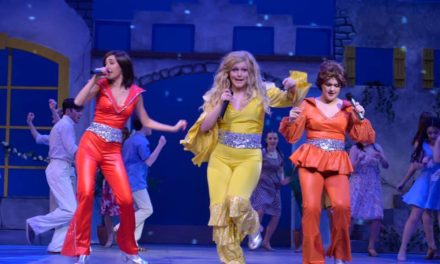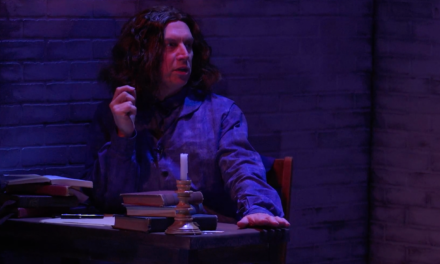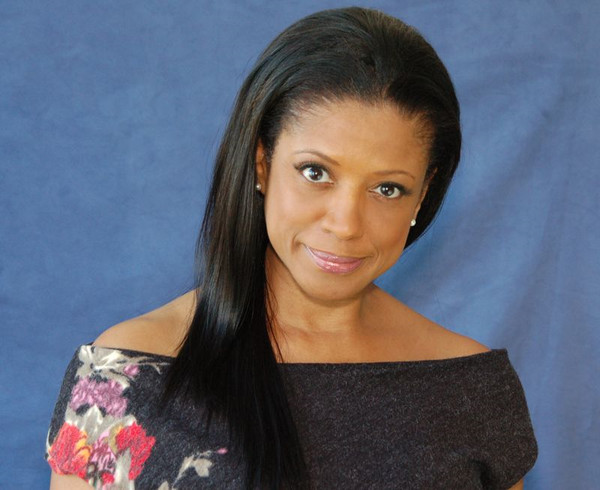Crystian Wiltshire & Megan Massie in Romeo and Juliet. Photo by Holly Stone.
Romeo and Juliet
By William Shakespeare
Directed by Matt Wallace
Review by Eli Keel
Entire contents copyright © 2016 Eli Keel. All rights reserved.
There is so much interesting stuff going on in Kentucky Shakespeare Festival’s excellent production of Romeo and Juliet, it’s hard to know where to start. But despite my usual reluctance to mention pre-show entertainment, just this once I’ll begin there.
On preview night the audience got a peek at a program called The Bard Buddies. It’s one of the many programs that Kentucky Shakespeare offers to kids around Kentucky. With the epic transformation of KY Shakes’ summer season, it’s easy to forget how much of what they do is still educational, happening throughout the year and out of public sight.
For Bard Buddies, an actor/teacher works through one of the classic Shakespearian plays with kids under the age of 12. The kids quote lines, and do simplistic blocking at the direction of the on stage educator, in this instance Melinda Beck. She was working with kids from Kindergarten Countdown and a good number of random kids from the park, who were invited up to the stage. For them, the story was brand new, undiscovered country. The result was unsurprisingly adorable. But more importantly, it was no doubt an experience that will stay with those kids their entire lives, and hopefully ignite a lasting love for the works of the Bard of Avon.
It’s a reminder that Artistic Director Matt Wallace seems to be playing the long game here in Louisville. That mindset of education and exploration was all over the evening. While Romeo and Juliet is possibly Shakespeare’s best-known work, Wallace’s production is showing the audience new things through casting, the cut of the play, and some high concept costume changes.
You know the story right? I don’t need to go over it?
While Wallace no doubt serves several masters in the crafting of each season, the superposition of R & J after Two Gentlemen of Verona and The Winter’s Tale reveals aspects of the more popular play that even long time veterans might otherwise miss. And I don’t for a second believe that’s an accident.
First up we had Two Gentlemen of Verona; with its Italian setting, the banishing of one of its characters to Mantua, and brash young love, it almost plays as the comedic version of Romeo and Juliet. It was written shortly before R & J, and it’s easy to see how Shakespeare got from one to the other.
And then we had The Winter’s Tale. One of the so-called “problem” plays, it’s often noted that it feels like a tragedy in the first half, and a comedy in the second act.
Though R & J is the best-known tragedy on the planet, it’s practically a comedy for the first half. Shakespeare is always careful to include plenty of comic relief in his tragedies, and Wallace never shies away from those moments, but the first half of R & J has goofy servants, more wordplay than you can shake a stick at, a couple of lovers who love against tall odds, youngsters who scorn at love, and every other hall mark of a great comedy.
Having seen Winter’s Tale less that a full week before I got a chance to check out R & J, I couldn’t help notice that the latter is an inversion of the former.
It’s worth pointing all this out, because starting next week you can revisit the season’s earlier offerings and see them play in repertory – or do it all in one night at the Bard-a-thon.
Wallace’s direction of the titular lovers really plays into the comedic reading of the first half. Crystian Wiltshire gives us a Romeo less dreamy than some are accustomed to, and more full of the adolescent energy and goofiness that a sweet sixteen year old might really have. Megan Massie’s Juliet is likewise lighthearted, coming across almost silly at first, just as a thirteen year old girl might, concerned with flirting and parties.
The other traditional first act stars like Benvolio (Braden McCampbell ) and Mercutio (Byron Coolie) are likewise keeping the stakes low. This provided a good number of laughs, and the Montague boys roam around Verona carousing and misbehaving, though Mercutio’s Queen Mab speech was robbed of the heights it can attain given more serious treatment.
Wiltshire’s speeches are likewise downplayed, which worked dramatically, but as it effectively glossed over some of my favorite poetry in the English language, I was a little sad.
It’s all so light and sweet; it almost comes across as saccharine. Neill Robertson’s Tybalt is the only character that lets on that he’s in a tragedy, with violent rage and besmirched honor. Robertson steals his scenes as he spits verse and vitriol.
Of course the first act ends moments after the deaths of Mercutio and Tybalt, and all of a sudden we remember we’re watching a tragedy. In this production it served to showcase how quickly foolishness can turn deadly, and how fragile innocence is. The second half of the play was so much bitterer for the juxtaposition of the sweetness that had come before.
In leading up to the show’s production, a lot has been made of the fact that Wallace has chosen to very consciously cast all African American actors to play the roles of the Montague’s. And yet, I hardly noticed in the first act, with its light tone and Elizabethan garb.
But as night fell and the second act began, the production becomes more complex, and Wallace and the cast start to pull at threads in the text and the reverse audience expectation. Throughout the second act, the actors slowly change from the period garb to contemporary gear, signaling a huge tonal shift, which is excellently supported by the text.
I’m not generally a fan of modern dress in Shakespeare; it always seems a little too eager to point out that “Hey, Shakespeare is still relevant!” If well acted, the words do the work; Air Jordans and skinny jeans aren’t necessary.
And yet the tonal shift that accompanied the slow transformation into modern day attire in the second act grounded the action and plot in a way I can’t recall seeing so successfully handled in any other modern dress production. As Massie, Wiltshire and others switched into tee shirts, jeans and tank tops, their performances became less airy. They grappled with the text in a way they hadn’t in the first act. The reality of the tragedy came to the fore, and the implied racial clash between Montague and Capulet hung heavy over the action.
A helping of praise should also be offered to whoever is responsible for the cut of the play that KY Shakes is using. There’s often a tendency to trim the back half of R & J down to bare bones. It makes the play fast, and keeps the focus on the lovers, but it robs Juliet of her motivations for such extreme acts. In the current production, Jon Huffman and Abigail Maupin’s Lord and Lady Capulet are given their chance to terrorize Juliet to the point that she is willing to undertake drastic actions. Huffman and Maupin are dynamite in the scenes, and Massie holds her own with the more seasoned veterans.
Letting the second half breathe and build also gave the final moments an urgency they often lack. By the time the final scene in the crypt rolls around, the stakes felt real, and I found myself caring about these two pointless deaths much more than I’m used to.
Romeo and Juliet (and this season as a whole) present a big departure for Kentucky Shakespeare. For his first two seasons Wallace played it straight and didn’t take many chances with the summer seasons, turning out solid work. But I think I prefer this new Wallace we’re starting to get glimpses of this season. He’s daring, presenting cerebral ideas in grounded and moving productions.
I’m excited to see what he does next.
Romeo and Juliet
June 30-July 3, 5-10, 12,15, 20, 24, 2016
8:00PM Nightly Free Show; 7:15 pre-show
Kentucky Shakespeare Festival
In Central Park
502-574-9900
kyshakespeare.com
Eli Keel is an arts reporter and culture critic. He has been published at Salon, The Mary Sue, NPR affiliate Louisville Public Media, Collider, Louisville Magazine, and Insider Louisville. As an actor, he has worked with Actors Theatre of Louisville, Kentucky Shakespeare Festival, and is a founding member of Theatre [502]. As a playwright, he has been produced by Theatre [502], Finnigan Productions, and The Bard’s Town. He is the producer and host of The Portland Poetry Series, in the historic Portland neighborhood of Louisville, Kentucky.





